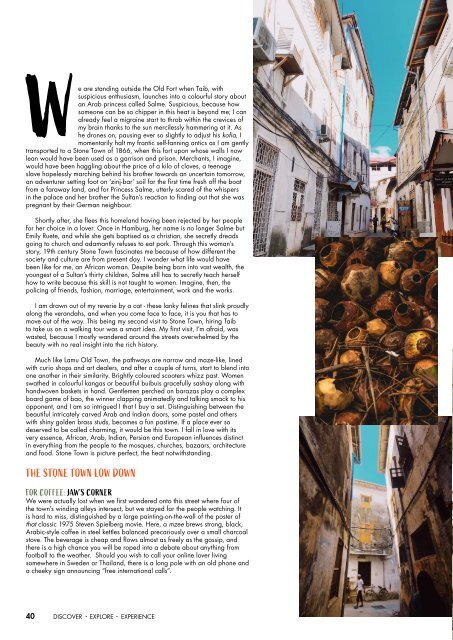You also want an ePaper? Increase the reach of your titles
YUMPU automatically turns print PDFs into web optimized ePapers that Google loves.
We are standing outside the Old Fort when Taib, with<br />
suspicious enthusiasm, launches into a colourful story about<br />
an Arab princess called Salme. Suspicious, because how<br />
someone can be so chipper in this heat is beyond me; I can<br />
already feel a migraine start to throb within the crevices of<br />
my brain thanks to the sun mercilessly hammering at it. As<br />
he drones on, pausing ever so slightly to adjust his kofia, I<br />
momentarily halt my frantic self-fanning antics as I am gently<br />
transported to a Stone Town of 1866, when this fort upon whose walls I now<br />
lean would have been used as a garrison and prison. Merchants, I imagine,<br />
would have been haggling about the price of a kilo of cloves, a teenage<br />
slave hopelessly marching behind his brother towards an uncertain tomorrow,<br />
an adventurer setting foot on ‘zinj-bar’ soil for the first time fresh off the boat<br />
from a faraway land, and for Princess Salme, utterly scared of the whispers<br />
in the palace and her brother the Sultan’s reaction to finding out that she was<br />
pregnant by their German neighbour.<br />
Shortly after, she flees this homeland having been rejected by her people<br />
for her choice in a lover. Once in Hamburg, her name is no longer Salme but<br />
Emily Ruete, and while she gets baptised as a christian, she secretly dreads<br />
going to church and adamantly refuses to eat pork. Through this woman’s<br />
story, 19th century Stone Town fascinates me because of how different the<br />
society and culture are from present day. I wonder what life would have<br />
been like for me, an African woman. Despite being born into vast wealth, the<br />
youngest of a Sultan’s thirty children, Salme still has to secretly teach herself<br />
how to write because this skill is not taught to women. Imagine, then, the<br />
policing of friends, fashion, marriage, entertainment, work and the works.<br />
I am drawn out of my reverie by a cat - these lanky felines that slink proudly<br />
along the verandahs, and when you come face to face, it is you that has to<br />
move out of the way. This being my second visit to Stone Town, hiring Taib<br />
to take us on a walking tour was a smart idea. My first visit, I’m afraid, was<br />
wasted, because I mostly wandered around the streets overwhelmed by the<br />
beauty with no real insight into the rich history.<br />
Much like Lamu Old Town, the pathways are narrow and maze-like, lined<br />
with curio shops and art dealers, and after a couple of turns, start to blend into<br />
one another in their similarity. Brightly coloured scooters whizz past. Women<br />
swathed in colourful kangas or beautiful buibuis gracefully sashay along with<br />
handwoven baskets in hand. Gentlemen perched on barazas play a complex<br />
board game of bao, the winner clapping animatedly and talking smack to his<br />
opponent, and I am so intrigued I that I buy a set. Distinguishing between the<br />
beautiful intricately carved Arab and Indian doors, some pastel and others<br />
with shiny golden brass studs, becomes a fun pastime. If a place ever so<br />
deserved to be called charming, it would be this town. I fall in love with its<br />
very essence, African, Arab, Indian, Persian and European influences distinct<br />
in everything from the people to the mosques, churches, bazaars, architecture<br />
and food. Stone Town is picture perfect, the heat notwithstanding.<br />
THE STONE TOWN LOW DOWN<br />
FOR COFFEE: JAW’S CORNER<br />
We were actually lost when we first wandered onto this street where four of<br />
the town’s winding alleys intersect, but we stayed for the people watching. It<br />
is hard to miss, distinguished by a large painting-on-the-wall of the poster of<br />
that classic 1975 Steven Spielberg movie. Here, a mzee brews strong, black,<br />
Arabic-style coffee in steel kettles balanced precariously over a small charcoal<br />
stove. The beverage is cheap and flows almost as freely as the gossip, and<br />
there is a high chance you will be roped into a debate about anything from<br />
football to the weather. Should you wish to call your online lover living<br />
somewhere in Sweden or Thailand, there is a long pole with an old phone and<br />
a cheeky sign announcing “free international calls”.<br />
40 DISCOVER EXPLORE EXPERIENCE

















